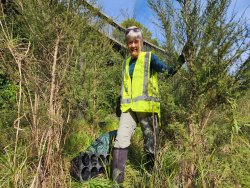Volunteers doing the mahi to restore and enhance the natural habitat in Hobsonville Point

Restoring and enhancing the natural habitat around Hobsonville Point in Auckland's Upper Waitemata for everyone, including local birds, invertebrates and fish life, to enjoy is the focus of a community-based group of volunteers.
The group, Habitat Hobsonville, is co-ordinated by Annette Mitchell and falls under the umbrella of Upper Waitematā Ecology Network (UWEN). UWEN is a collaboration of community based environmental protection groups working across the Upper Waitematä Harbour area to protect native habitats at a local and landscape scale.
Habitat Hobsonville volunteers are largely focused on trapping predators such as rats, stoats and possums, removing noxious plants such as privet, tobacco weed, woolly nightshade and moth plant, plus planting, restoring and regenerating native habitats, and measuring the impact of their actions.
They work with, and are supported by, Auckland Council, Upper Harbour Local Board, Kaipatiki Project and the Hobsonville Point Residents Society. Over several years they have operated within Hobsonville Point, which has seen a considerable amount of residential and commercial development over that time.
It was a glorious sunny spring day when Volunteering Auckland caught up with Annette and the Habitat Hobsonville team of volunteers. They were focused on the Sunderland East Wetland which forms part of the Hobsonville Point Coastal Walkway – and which is one of their key restoration projects.
This wetland connects with the Upper Harbour and is important as it provides a habitat for both invertebrates and birds. The team planted an impressive 100 plants – including cabbage trees, oioi (a reed-like native grass), harakeke (native flax) and manuka. This was followed by a shared cuppa and morning tea (‘a key ingredient for connecting and nurturing volunteers’, says Annette).
The second key Habitat Hobsonville project is Nimrod Esplanade Reserve at Scott Point. Planted two years ago as part of the housing developers' contractual obligations, it became ‘a bit of a sorry sight, as it unfortunately wasn't well maintained’, Annette comments.
Since 2023, volunteers have planted seven hundred new native plants and trees. Ongoing maintenance and mulching are key to their survival – which was the gap now filled by Habitat Hobsonville volunteers.
‘The goal is for volunteers, with new ones always welcome to join us, to plant a further two thousand native plants and trees over the next three years,’ Annette says. ‘This project is key to connecting birds with suitable habitats, with kererū being a key focus. This means planting their food source, such as puriri, miro, kowhai and taraire.’
As well as attracting and sustaining thriving birdlife – the sustainability of the volunteer group, as people’s lives change, is also top of Annette’s mind.
Succession planning for her role as co-ordinator is key – so that knowledge, skills and resources are identified and passed on. Habitat Hobsonville a database of about two hundred volunteers, with new residents joining all the time. Annette attends and presents at regular meetings held to welcome new residents to Hobsonville Point.
Volunteering on Habitat Hobsonville projects has provided a great pathway for new immigrants to connect with their new homeland and local people. One of our volunteers, Jeff, travels from Penrose to attend our volunteer working bees which is a remarkable effort.
By Delia Middleton
Volunteer writer
PHOTOS: Ruth Jackson
INTERESTED IN VOLUNTEERING?
See UWEN’s current volunteering opportunities at
https://volunteeringauckland.org.nz/orgs/2119-upper-waitemata-ecology-network
Check out hundreds of other volunteering opportunities on the Volunteering Auckland website:
https://volunteeringauckland.org.nz/individuals/opportunities

